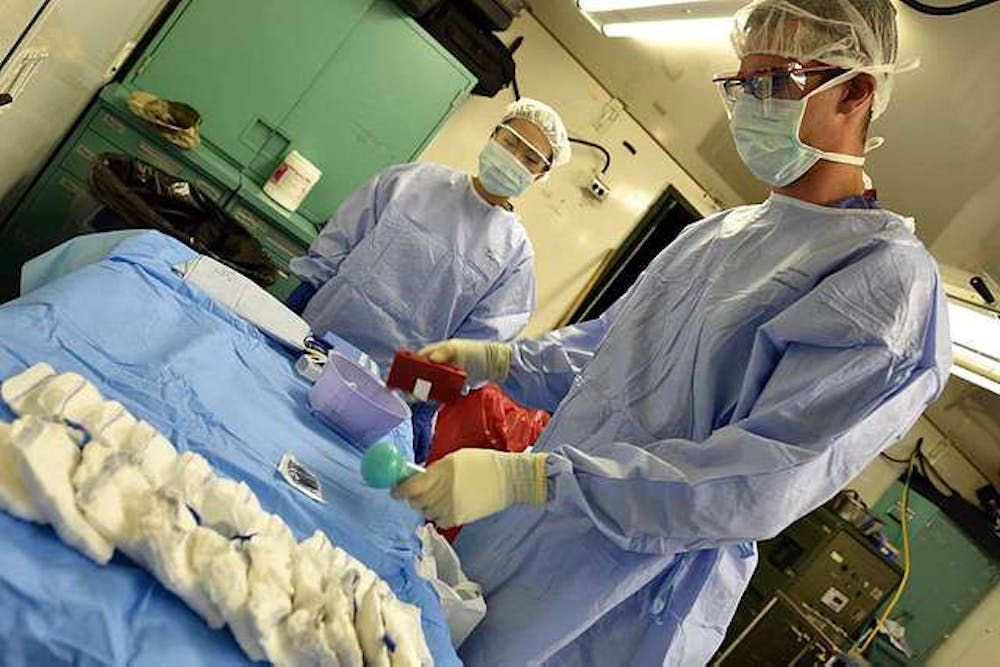On Tuesday, Nov. 7, the Johns Hopkins Health Policy Forum invited Chairman, CEO and President of Becton, Dickinson and Company (BD) Tom Polen to share his insights into the current state of global health care and BD’s role in it. Polen was joined by Dean of Carey Business School Alex Triantis.
BD is the world’s largest manufacturer of medical devices, with 48,000 unique products being used in over 90 countries around the globe. Each year, according to Triantis, they produce over 31 billion devices. Polen came to BD in 1999 and was named president in 2017 following the acquisition of C. R. Bard.
The event began with Polen sharing that — like many in health care — his work was spurred and shaped by personal experiences, most significantly the loss of his mother.
“When I was getting ready for school one day, at 13 years old, my sister and I were getting dressed, getting our bookbags on. Our mom was helping us and, at 35 years old, she suddenly collapsed in front of us in seizures. It was that experience at a young age, losing my mother, that really gave me a firsthand glance at health care, and I committed myself to making a difference in health care,” he said.
The conversation covered BD’s goals for the future and the strategies that are leading them there. Polen discussed the many challenges currently faced by global health care systems, including supply chain issues — which were brought into clear relief during the COVID-19 pandemic — geopolitical instability and conflict, health care inequality between rich and poor countries, and inflation.
When developing solutions to these problems, Polen stressed the importance of grassroots efforts developed in tandem with affected communities. In particular, this means recognizing that the challenges faced across the world are not the same. As an example, liver cancer is far more prevalent in China than in the U.S.; addressing this requires an understanding of Chinese laws and customs, which is only gained through working with Chinese companies and communities.
“The needs of societies are different, and the types of technologies we develop are very different. We strongly believe that we're not likely to solve the problems of health care in rural India by developing those technologies in New Jersey, where I sit today, so we rely on our local teams in India. We’re a big believer in going to the gemba, going to where the work happens, to where patients are being served,” he said.
Polen also discussed the growing role of artificial intelligence (AI) and robotics in shaping the future of the medical industry, noting the technology’s potential to improve treatments and reduce costs.
“We're applying AI to innovation; we currently have several FDA-cleared AI products that we are actively promoting and selling in the marketplace today. We're probably one of the first [companies] to have those,” he said. “We see that AI is having a transformative impact on the back office side of companies like us, and [that] means we continue to move more and more money into innovation that will help patients. It’s creating a flywheel, which will produce technologies that will have a greater impact.”
At the same time, Polen acknowledged the dangers that can accompany the use of AI, particularly open AI like ChatGPT. This can include compromised or leaked data sets, loss of intellectual property and alienation of patients. However, he hopes that the use of AI will free up physicians, pharmacists, nurses and other health care workers to expedite menial tasks and spend more time with their patients.
The conversation also included a discussion of medical waste and sustainability, noting the need to develop better recycling protocols. Finally, Polen talked about the changing landscape of the health care world, as chronic diseases become the biggest health care burden globally — which requires fundamentally different approaches than the infectious diseases that have historically caused the most deaths.
“We're very focused on improving chronic diseases… Over the last decade, [infectious disease] has been overtaken by chronic diseases like cancer, heart disease and diabetes as a leading cause of deaths and the highest cost burden on societies [in] essentially every corner of the planet,” he said. “We see huge opportunities for medical devices to play a highly impactful role in reducing that burden on patients and on society… [This includes] innovations that are helping move care to new settings where it can be more equitable and easier for people to reach at a lower cost.”





